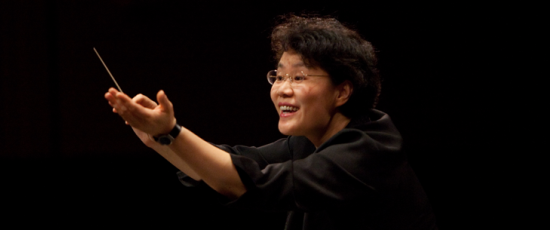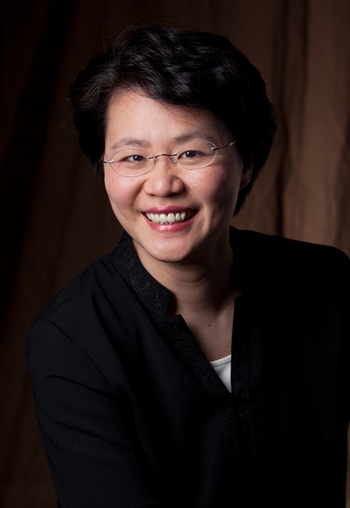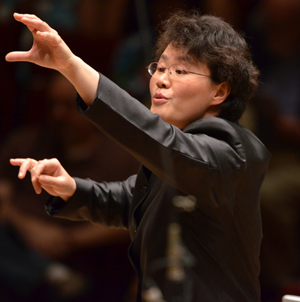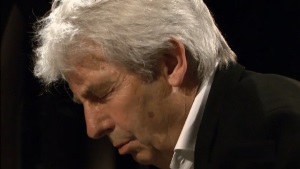Sarasota Aisle: Chicago maestro Mei-Ann Chen captures audience and accolades in Florida
 Review: Sarasota Orchestra conducted by Chicago Sinfonietta music director Mei-Ann Chen, with pianist Jean-Philippe Collard, on March 9 at Van Wezel Performing Arts Hall.
Review: Sarasota Orchestra conducted by Chicago Sinfonietta music director Mei-Ann Chen, with pianist Jean-Philippe Collard, on March 9 at Van Wezel Performing Arts Hall.
By Lawrence B. Johnson
SARASOTA, Fla. — There’s an infamous jest that if you ask six reviewers about the same event, you’ll get seven different opinions. As there is more than a grain of truth in that, conductor Mei-Ann Chen surely is entitled to put a notch in her baton after winning a consensus of enthusiasm from a dozen arts writers from across the U.S. and Canada following her guest appearance March 9 with the Sarasota Orchestra.
 Chen, a native of Taiwan and music director of both the Chicago Sinfonietta and the Memphis Symphony Orchestra, worked her beguiling spell with Rimsky-Korsakov’s “Scheherazade” on a program shared by Ravel’s Piano Concerto in G with soloist Jean-Philippe Collard at Sarasota’s Van Wezel Performing Arts Hall.
Chen, a native of Taiwan and music director of both the Chicago Sinfonietta and the Memphis Symphony Orchestra, worked her beguiling spell with Rimsky-Korsakov’s “Scheherazade” on a program shared by Ravel’s Piano Concerto in G with soloist Jean-Philippe Collard at Sarasota’s Van Wezel Performing Arts Hall.
The concert was a buzz-worthy diversion from an intensive few days at the Sarasota Opera, where the main attraction among several works was the rarity of Verdi’s early “Jérusalem,” a retooling for Paris of his opera “I Lombardi alla prima crociata” (The Lombards at the First Crusade).
Conducting without a score, Chen made a particularly striking impression in the poetic nuances she consistently – one might surmise innately – accentuated, qualities that a less confident and perceptive conductor might have sacrificed in favor of the many sweeping gestures that punctuate “Scheherazade.” But an overly grand approach can end up reducing the work’s more delicate episodes to a series of overly sweet interludes. Chen’s reading made glorious images of Rimsky’s eloquent lyricism. Here, indeed, was painting with a fine brush.
 The Sarasota orchestra seemed to be playing its collective socks off for her, not in an effusion of sound but in balanced, intimate ensemble conversations – with seductive solos by flute, oboe, clarinet and bassoon as well as assured soliloquies by concertmaster Daniel Jordan — that put this listener in mind of a properly contoured Mahler symphony performance. And on that scale, Rimsky’s high-rolling waves of sound, when they came, made a greater impact than one might have expected from this orchestra’s modest numbers.
The Sarasota orchestra seemed to be playing its collective socks off for her, not in an effusion of sound but in balanced, intimate ensemble conversations – with seductive solos by flute, oboe, clarinet and bassoon as well as assured soliloquies by concertmaster Daniel Jordan — that put this listener in mind of a properly contoured Mahler symphony performance. And on that scale, Rimsky’s high-rolling waves of sound, when they came, made a greater impact than one might have expected from this orchestra’s modest numbers.
Though she cuts a petite figure on the podium, Chen confronts the viewer with a conducting style that is, to put it gently, kinetic. Yet what sometimes caught the eye as histrionic was quite different from what charmed the ear: The hallmarks of her “Scheherazade” were grace and subtlety. At times, Chen dropped her hands altogether, allowing the orchestra to float through a passage that required no steering. Never did the orchestra sound driven.
 Collard’s Ravel concerto — bluesy, sensuous, articulate — bespoke the absolute authority of this veteran French pianist. That said, the interaction between keyboard and orchestra was hard to discern as the downstage piano, its lid fully opened, dominated whatever sound was being produced by the band. One couldn’t help wondering if the balance might have been improved by lowering the piano lid.
Collard’s Ravel concerto — bluesy, sensuous, articulate — bespoke the absolute authority of this veteran French pianist. That said, the interaction between keyboard and orchestra was hard to discern as the downstage piano, its lid fully opened, dominated whatever sound was being produced by the band. One couldn’t help wondering if the balance might have been improved by lowering the piano lid.
For the Ravel’s duration, the acoustical experience in the 1,736-seat hall verged on one of concerto for piano without orchestra. Perhaps the supporting ensemble’s aural remove was simply what it appeared to be, a function of the stage setup and listening space and beyond immediate repair, even by the energetic Chen.
Tags: Chicago Sinfonietta, Daniel Jordan, Jean-Philippe Collard, Mei-Ann Chen, Memphis Symphony Orchestra, Sarasota Orchestra

